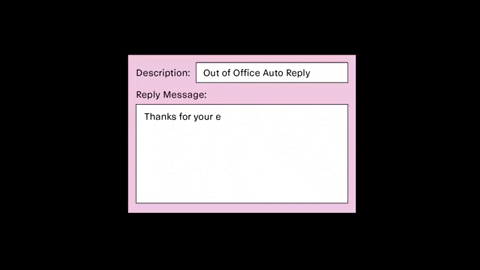Feeling fried from the daily grind?
We all hit that wall where a breather isn't just nice—it's neeeeeeeded. Let’s talk about writing a time off request email. This piece is your roadmap to getting that well-deserved break, whether it’s for sandy beaches or couch marathons. You’ll pick up pointers on spotting burnout signs and how best to communicate your need for downtime.
Approximately 40% of employees feel uncomfortable requesting time off from their employer. But nearly 60% of employees report that a well-crafted email is the most effective way to request time off.
So here's the good news: get that well-deserved time off by writing the perfect e-mail to your boss. In this article, you'll learn how to navigate company vacation policies with ease and pen an email that balances professionalism with personal touch—no crossed wires or sweaty palms.
Everyone Needs Time Off Sometimes

We've all been there—burnout is knocking on our door, and high stress levels are making it tough to get a good night's sleep. But when do these signs say it's time to hit pause?
Difficulty sleeping could be one signal that your body needs a break. Irritability with colleagues or family might not just be about what they did or didn't do—it often reflects personal strain.
So why wait until you're running on empty? Planning vacation time in advance isn't only wise; it’s crucial for maintaining balance. It gives us something to look forward to and ensures we don’t reach the point of exhaustion before we step away from our desks.
Remember, taking breaks isn’t slacking off—it’s charging up for better productivity ahead.
How Do You Write a Time Off Request Email?
Whether it's for a well-deserved vacation or an unforeseen personal matter, writing a professional email to request time off is crucial. It’s all about striking the right tone and providing necessary details without overcomplicating your message.
A clear and concise subject line will set the stage for your leave request. Consider phrases like 'Vacation Request - [Your Name]' or 'Requesting Time Off for Personal Reasons'.
This direct approach helps ensure that your email gets timely attention from management. Inside the body of the email, begin by stating upfront what you're asking for—be it paid vacation days or unpaid personal time—and specify dates if possible. Being straightforward shows respect for your recipient's time.
Politeness goes far in these emails; after all, you’re not just requesting but also showing gratitude towards those who accommodate this need. Wrap up with offers to help prepare team members before leaving so as not to disrupt workflow—a sign of being a considerate team player.
What Should Be Included in a Time Off Request Email
Your message should be succinct yet detailed enough that readers don't have lingering questions which could delay approval. Take a look at some key details you should include:
1. Subject Line & Greeting
Be clear and direct. For example, "Request for Time Off – [Your Name]". Address your boss formally, using their proper title and name, e.g., "Dear Mr,Ms. [Last Name],". Open with something simple like "good morning."
2. Reason for Your Email
Start with a brief statement indicating that you are writing to request time off.
3. Include Specific Dates:
Clearly state the dates you are requesting off. If you are flexible, indicate this as well.
4. Reason for Time Off (Optional)
While you are not obligated to, if you feel comfortable, you can briefly mention the reason for your time off request (e.g., vacation, personal reasons, medical procedure). This can be a simple one-liner.
5. Tell Your Boss Your Work Plan During Your Absence & Give Them Assurance Nothing Will Be Disrupted
Outline how you plan to manage your work before, during, and after your absence. This might include completing tasks in advance, delegating responsibilities, or setting up an out-of-office email response. Reassure your boss that you have considered how your absence will impact your work and team, and have taken steps to mitigate any issues.
6. Request for Approval & Close
Politely ask for their approval of your time off request, and indicate your willingness to discuss the matter further if needed. End with a formal closing, like "Best regards" or "Thank you," followed by your name.
Note: Throughout the email, maintain a polite and professional tone. If you have a good relationship with your supervisor, this might feel overly formal, but it's better to err on the professional side.
8 Examples of Time Off Request Email Templates
To get you going, here's some samples of time off request emails to use. Tweak them as you need to fit your situation and tone. (Pro tip: You can add these templates into Magical and call them up anywhere and anytime you need with the click of a button. Magical will even personalize the email with the name of your recipient!)

Sample 1: General time off request
Subject: Request for Time Off – [Your Name]
Dear [Boss's Name],
I hope this message finds you well. I am writing to formally request time off from work, specifically for the dates of [start date] to [end date].
This time off is important to me because [briefly state reason, if comfortable sharing]. I have reviewed my current projects and workload, and I believe this period will be the least disruptive for my absence.
To ensure my responsibilities are covered, I plan to [briefly outline your work plan], and I am happy to make any necessary adjustments to this plan based on your guidance.
I hope that my request can be accommodated, and I am available to discuss this further if needed. Thank you very much for considering my request.
Best regards,
[Your Name]
Sample 2: Vacation Request
Subject: Vacation Time Request – [Your Name]
Dear [Boss's Name],
I would like to request vacation time from [start date] to [end date]. I've ensured that this period aligns with our team’s schedule and does not conflict with any major deadlines or projects.
During my absence, I will ensure all my current tasks are up to date, and I'll brief [Colleague's Name] to cover any urgent issues that may arise.
Thank you for considering my request. I look forward to your approval.
Best,
[Your Name]
Sample 3: Request for Personal Day(s)
When it comes to a personal day, you can provide as much or as little information as you want. It's usually better to provide less details.
Subject: Request for Personal Day(s) – [Your Name]
Dear [Boss's Name],
I am writing to request a personal day off on [date/dates]. This time will allow me to attend to important personal matters.
I will make sure all my work is up to date before my day off, and I am happy to work extra hours if necessary, before or after my requested date, to ensure all my responsibilities are managed.
Thank you for your understanding and consideration.
Sincerely,
[Your Name]
Sample 4: Request for Time Off for Medical Reasons
Subject: Time Off Request for Medical Appointment – [Your Name]
Dear [Boss's Name],
I would like to request time off on [date] for a medical appointment. I anticipate being away from work for approximately [number of hours/days].
I will ensure that all my tasks are up to date, and I have arranged for [Colleague's Name] to cover any urgent matters in my absence.
Thank you for your understanding.
Best regards,
[Your Name]
Sample 5: Request for Extended Leave
Subject: Request for Extended Leave – [Your Name]
Dear [Boss's Name],
I am writing to request an extended leave of absence from [start date] to [end date] due to [personal reasons/family matters/extended travel plans].
I understand this is a lengthy period, and I am ready to assist in any way possible to ensure a smooth transition before my leave. I have prepared a detailed handover plan and am willing to provide training or support to any team member who will be covering my duties.
I would appreciate the opportunity to discuss this in more detail to address any concerns and ensure continuity in my absence.
Thank you for considering my request.
Sincerely,
[Your Name]
Sample 6: Request for Half-Day Leave
Subject: Half-Day Leave Request – [Your Name]
Dear [Boss's Name],
I would like to request a half-day off on [date], due to [reason – e.g., personal appointment, family obligation]. I plan to be available for work in the [morning/afternoon].
I will ensure that all critical tasks are attended to before my leave, and I will remain accessible via phone or email should anything urgent arise.
Thank you for considering my request.
Kind regards,
[Your Name]
Sample 7: Last-Minute Time Off Request
Sometimes you don't have proper notice to request time off.
Of course, it’s best to plan time off ahead of time, but that’s not always possible. And these days, many people understand that workers need time off for a variety of reasons, not all of which come with advance notice. A few of the many reasons someone needs to take a day off on short notice include: medical emergencies, family emergencies, doctors appointments, funerals, natural disasters, mental health crises, and once-in-a-lifetime opportunities (such as a concert or a great job interview).
-AJ Hess, Editor at Fast Company
Subject: Urgent Time Off Request – [Your Name]
Dear [Boss's Name],
I apologize for the short notice, but I need to request an unexpected day off tomorrow due to [brief explanation – e.g., a personal emergency].
I have briefed [Colleague's Name] on my current projects, and they have kindly agreed to oversee any urgent tasks in my absence.
I appreciate your understanding and am available to discuss any immediate concerns you may have.
Thank you,
[Your Name]
Sample 8: Requesting Time Off for Study/Exams
Subject: Time Off Request for Study/Examination – [Your Name]
Dear [Boss's Name],
I am currently pursuing [course/degree], and I have an upcoming exam on [date]. Therefore, I would like to request a day off on [date] to prepare for and attend my examination.
I have arranged my work schedule to ensure all tasks are completed in advance, and I am coordinating with [Colleague's Name] to cover any urgent inquiries while I am away.
Thank you for supporting my continued professional development.
Best wishes,
[Your Name]
Note: In all these samples, it's important to maintain a professional tone and provide sufficient information for your boss to understand and consider your request. Also, be sure to adhere to any specific protocols your company may have regarding time off requests.
Best Practices When Asking for Leave
We all crave that well-deserved vacation or may find ourselves feeling unwell and in need of sick leave. But requesting time off can be a delicate dance, especially when aiming to maintain harmony within the team. To strike the right chord, start by crafting your request with proper grammar—it reflects professionalism and respect for your reader.
A solid tip is choosing timing wisely; it's not just about convenience but also showing you're mindful of team schedules. Give as much advance notice as possible because it shows forethought and consideration—qualities of a true team player.
Delegating Responsibilities During Your Absence
Prioritize open communication with colleagues about coverage plans during your absence discuss who will handle what tasks ensures nothing falls through the cracks. This proactive approach not only secures workflow continuity but also demonstrates commitment even while out of office—the hallmark of someone dedicated both personally and professionally toward achieving healthy work-life balance.
Know Your Company's Policy on Time Off
Understanding your company's vacation policy is like reading a map before setting off on a journey. It helps you plot out your route, ensuring no surprises along the way. When you're planning to request time away from work, first grab your employee handbook—it’s there where you'll find the compass for navigating paid vacation time and other leave details.
The Difference Between Paid vs Unpaid Time Off
Paid time off is often seen as one of those treasures within the workplace—a chance to recharge without sacrificing pay. However, not all leaves are covered under this treasure chest as some might be unpaid, like certain personal days or extended medical leave beyond what's allotted.
It's crucial to differentiate between these types in advance so that when requesting vacation days or handling an unexpected family emergency, financial considerations won't add extra stress.
To get more clarity on whether jury duty will come with a paycheck or if bereavement leave offers both solace and salary support—consulting with HR can clear up any foggy areas around such benefits. Remember that while some companies offer generous paid-time policies others stick strictly by federal guidelines outlined by FMLA regulations.
FMLA Considerations in Leave Requests
If facing serious health concerns either personally or within the family circle—the Family Medical Leave Act (FMLA) could serve as an anchor providing up to 12 weeks of unpaid but job-protected absence from work annually. Knowing how FMLA intertwines with your company's specific policies will ensure smooth sailing when presenting formal requests for medical-related absences.
A good rule here is to start conversations early with HR about potential FMLA needs so everyone remains well-informed long before waves hit shore. That way there’ll be less scrambling should sudden storms arise calling for extended leaves.
Preparing Your Team for Your Absence
Taking time off is vital for a healthy work-life balance, but it's just as important to leave your team in good shape. Here are some steps you can take.
Communicating Effectively With Your Team Before You Go
Before you pack up and head out, sit down with your team members to discuss coverage plans. Transparency fosters trust; so let them know about your absence well ahead of time. This open communication will help minimize disruptions and maintain workflow consistency while you're away.
A group meeting or one-on-ones might be the most effective way to cover all bases—everything from client communications to internal project responsibilities. It’s not just about leaving notes; it’s about engaging in dialogue that ensures everyone understands their roles clearly.
Develop a clear plan for complex issues and tell people who will cover for you where they can find relevant information.
Delegating Responsibilities During Your Absence
To ensure nothing falls through the cracks during your vacation or personal days, create a detailed handover document outlining tasks and deadlines. Assigning specific duties to individual team players can make sure each person knows what they need to do without overwhelming anyone on short notice.
If possible, introduce cross-training sessions before any planned absences so that multiple people can step into critical roles if needed—an excellent rule of thumb for maintaining productivity under unforeseen circumstances like sick leave or family emergencies.
How to Request More Time Off At Your Job

You might have started your role with a limited number of days off or perhaps you want an increase because you've been working at the company for some time. In situations in which you might not be interested in or able to get a pay increase, asking for more vacation time is an alternative.
When doing this, it might be best to have this conversation in person.
It’s easiest to tie your request to performance evaluations or salary reviews, because that gives you a natural opening where you and your boss are both already reflecting on and discussing your performance. In that context, assuming you’ve received a positive performance review, you could say something like, “One thing that would keep me really happy here is if we were able to increase the amount of vacation time I receive each year. Would you be open to giving me an additional week of vacation per year in recognition of the work I’ve been doing?
-Alison Green, The Cut Workplace Advice Columnist
A Final Word
Feeling ready? You should be. Crafting a time off request email just got simpler. Start by tuning into your own needs—burnout is real, and recognizing it is the first step to taking care of yourself.
Even when you have to take that all important time off, you still should keep professionalism while doing it. Don't leave your coworkers in the lurch and be honest about what's going on.
